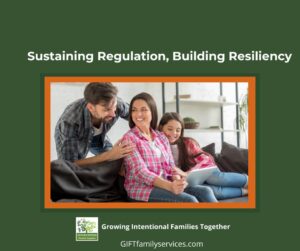 Sustaining Regulation & Building Resiliency are important parenting tasks . Yet, it is not always easy to accomplish because our lives not only unfold in the security of our homes, but also against the backdrop of the world at large. The world feels more unsettled and dysregulated than ever, doesn’t it? Sadly, much of the stress and concern about world events, national politics, and the multiple challenges of daily life can easily overflow into our family lives. Even though our family relationships are our most important, often they feel the brunt of our frustrated, overstressed selves.
Sustaining Regulation & Building Resiliency are important parenting tasks . Yet, it is not always easy to accomplish because our lives not only unfold in the security of our homes, but also against the backdrop of the world at large. The world feels more unsettled and dysregulated than ever, doesn’t it? Sadly, much of the stress and concern about world events, national politics, and the multiple challenges of daily life can easily overflow into our family lives. Even though our family relationships are our most important, often they feel the brunt of our frustrated, overstressed selves.
Our partners, family members, and co-workers are also buckling under the weight of similar pressures. That’s not a match made in heaven. Just the opposite, it is a pairing that demands our alert selves, our fullest commitment, and our strongest intentionality. Yes, friends and family will generally forgive our snark, inattention, and our blow ups. That is, if they are the exception, and not the norm. And if we make the necessary attempts to acknowledge and repair.
Pause for a moment and consider this question: If you exchanged places with your children or partner, how would you rate the health of your relationship? See it through theirs eye and feelings. Would you feel connected, nurtured, safe, seen, loved, and feel generally content? Use the answer to that question to guide you in making any adjustments. What will you do less? What will you do more often? What will you stop doing? What will you start doing?
Now, shift your focus and ask those same questions about how you are in relationship with yourself. Take note of how consistently you are able to stay regulated and in your thinking brain. Why is this so vital?
Presence versus presents
Because one of the best things we can give our children is our presence — to be attentive, regulated parents. In her book, “Regulation and Co-Regulation,” Ginger Healy, MSW, LCSW, writes, “Just like any other skill, emotional regulation has to be modeled and taught, and that is what we are doing when, as adults, we co-regulate with children.” Robyn Gobbel, MSW a therapist but with a focus on neuroscience reminds us in her new book, “Raising Kids with Big Baffling Behaviors“ that “Regulated, connected parents who feel safe, parent well.” And isn’t that what we all want to do. parent well?
By the way, it’s important to keep some perspective here too. Healy also wrote, ” You don’t have to set yourself on fire to keep others warm.” Remember to meet your own needs. Otherwise, self-regulation will remain elusive. And, of course, we can’t share what we don’t have, right?
Now that we’ve established the need to have self-regulation, how can it serve our children? (Lori Petro, Teach through Love) Lori created a meme that read: “If we want self-regulated children, we have to consistently and repeatedly show them what that looks like.”
This is the point. We must set the example. We must draw from our own regulation to help nurture our children’s emerging ability to self-regulate. And, when they do get dysregulated–of course they will! After all they are kids not mini-adults–they need to be able to draw on our regulation to reset themselves.
And this is the benefit: our regulation soothes their dysregulation and build resiliency. We all feel better. More connected. More validated. And strengthened for the journey that is life.
So, just how can we accomplish this task?
First, to whatever extent possible, reduce exposure to the sources of your stress. For, example, avoid checking the news several times a day. Of course, stay informed, however don’t immerse yourself in the disheartening news cycle. Learn what you need to know and then click off. Use your awareness to find ways to take some action–even something small. By being part of the solution effort you will help reduce your sense of helplessness.
Ideally, minimize young children’s exposure to the chaos, e.g., talk about current events as a family so you can provide them context and age-appropriate detail. While it might be tempting to sustain a news black-out, kids will likely hear about news events from other children or other adults. That’s why they need your parental perspectives. You can give them balance, allay their fears, and nurture a sense of hope.
Part of the way we share our regulation is by building rapport with our kids. This occurs when we are in synch with one another. Sometimes it happens intuitively. Sometimes we can intentionally strive to create rapport. Enjoy this charming video of a dad intentionally creating a rapport connection with his baby daughter. Rapport video
Two final questions:
- What can you do today to create a moment of rapport with each member of your family today?
- If the opportunity to make a relationship repair occurs today, what will you do to take advantage of it?
__________________________
-
- Call us at 1-800-653-9445
- Listen to our podcasts: Adoption Matters: Real People. Real Life. Real Talk and Essentials of Adoption Attuned Parenting
- Watch our YouTube channel
- Read Books written by our coaches
- Click to learn more about Adoption Attuned Certified coaching!
- Check out our on-demand courses.


